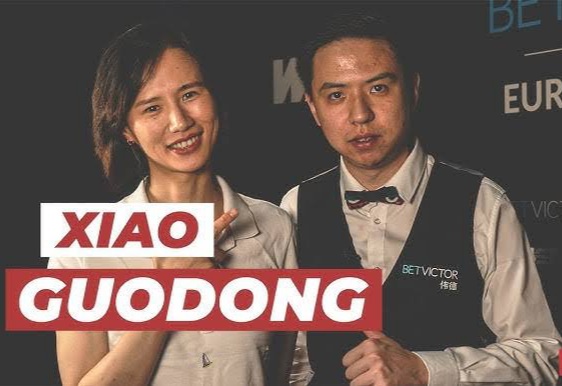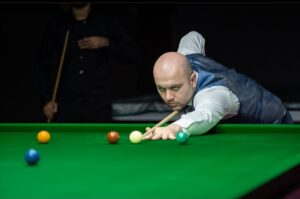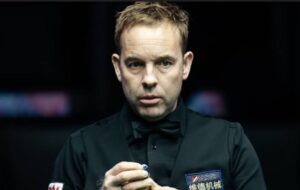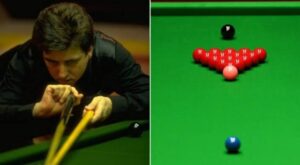UNVEILED: Xiao Guodong Opens Up About the Challenges of 2024 and His Goals for the Year Ahead

Xiao Guodong Q&A
China’s Xiao Guodong is enjoying the best season of his career so far, having won his first ranking title at the Wuhan Open, as well as reaching the final of the Champion of Champions and enjoying a spell among the world’s top 16. We caught up with the 35-year-old to reflect on the last few months.
Xiao, it has been a breakthrough season for you so far. What are the reasons behind the improvements you have made?
I don’t feel I’ve made significant improvements to my game itself, but I’ve grown mentally stronger. Even though I’ve won a title, reached finals, and made a few semi-finals, I still feel there’s still a gap between me and the top 16 players. My goal is to find more consistency and close that gap. I feel disappointed for not qualifying for the Masters, as I lost in the first round of the UK Championship. But I’ve moved on and hope to perform better next year, improving my ranking and inspiring other Chinese players. I recently got married, so balancing family and career is important. It’s no longer just about me, so I’ll selectively participate in events, prioritising major tournaments while considering family time. In upcoming events, I aim to stay relaxed, focus on enjoying the game, and not dwell on outcomes.
What are your ambitions for the second half of the season?
If I can break into the top 16 before the World Championship, that would be fantastic. My goal is to do well in key tournaments like the World Grand Prix, Players Championship and Tour Championship. As long as I enter a tournament, I’ll give it my all. The key is to enjoy the sport, whether you’re competing against top players or anyone else. Appreciate the joy the snooker table brings. Don’t overthink or let pressure consume you. Clear your mind and stay positive. I didn’t expect to turn things around against Ronnie O’Sullivan when I was 3-0 down at the Champion of Champions, but I focused on scoring a single point and eventually won 4-3. Luck and the unpredictable nature of snooker play a role, this is the charm of the sport.
How has your attitude to the sport changed, since you first joined the tour in 2007?
My original aspiration was to win titles and achieve good results, but I used to put too much pressure on myself during practice. When we first came here, players like me and Ding Junhui, we were pioneers in a way. There was immense pressure, not just for Ding in terms of performance, but for me, it was financial. When I first arrived, losing a match meant no prize money. Entry fees for tournaments were daunting, that was a few thousand pounds each season (editor’s note: entry fees were scrapped in 2017, and a minimum prize money guarantee of £20,000 was introduced in 2022). Back then, coming to the UK for a year could cost tens of thousands of pounds, an unimaginable expense for a normal Chinese family. This made it hard to enjoy snooker; I was always thinking about winning to alleviate the financial burden. I didn’t share this much with my family because, as an adult, I felt it was my responsibility to bear the load. Things improved over time, with changes in the system and increased prize money in Chinese tournaments. These changes helped shift my mindset.
Chinese players face many more challenges than British players. Most of the time we’re competing in a foreign country with language barriers, unfamiliar food, and a different way of life – it’s like being dropped into outer space! When I first arrived, I could only say “OK” and “Thank you.” Gradually, I’ve come to see the UK as a second home after so many years here. Today, younger Chinese players have it much easier. They can order food with apps, and there are many Chinese students around. The environment now is fantastic for them. Honestly, I envy them. If I could go back to their age and compete in today’s conditions, I’d feel much happier. Back then, life was about budgeting – saving money on food, buying cheaper groceries, and constantly worrying about expenses.
You are involved with nurturing talent back in China. What advice do you have for young players and their parents?
First and foremost, parents shouldn’t set lofty goals for their children, like aiming to become World Champion right from the start. Let the children enjoy playing. If they like it, encourage them to pursue it, but if they don’t, don’t force them. If a talented player emerges, find a good coach to guide them step by step. Don’t burden them with high expectations or heavy responsibilities too early. A happy childhood is essential, I’ve been through this, and I believe it’s crucial. Currently, I’m involved in youth training programmes. I’m recognized as one of Chongqing’s top 100 extracurricular educators. This certification, issued by the Bureau, allows me to teach young people outside regular school settings. I have encountered many talented kids, and I try to cultivate their interest and share my expertise, guiding them toward this path. If I retire from professional play, I’d consider dedicating myself to youth development. For now, though, my focus is on my own performance.
I also have a studio in Chengdu, where the local government has supported me with interviews and features, since I won the Wuhan Open. Through the ‘Sports Chengdu’ program, I’ve been introduced to promote the city, particularly Xindu District, with a three-minute feature. Back in Chongqing, the local TV station also aired a seven-to-eight-minute segment about me, showcasing my ranking event trophy to my hometown for the first time. These efforts reflect significant recognition from state media, especially as I’m the first ranking event champion from both Chongqing and the Sichuan area.





